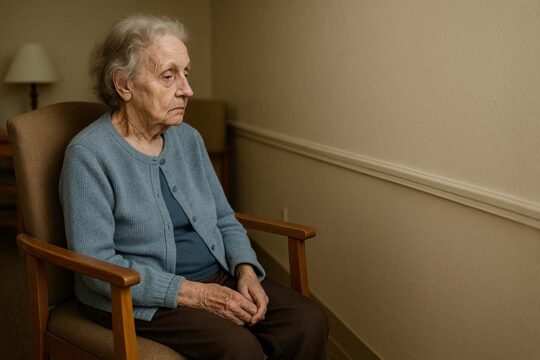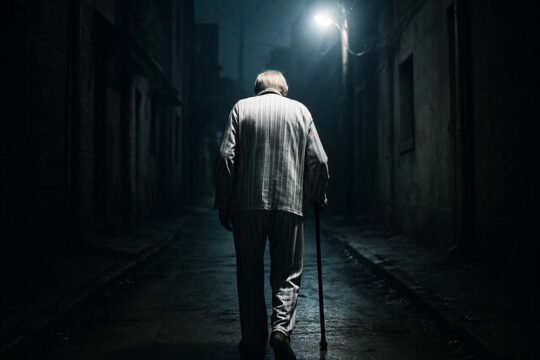
When Is It Time for Assisted Living?
How do you know when it is time for assisted living? Independence can be very important for the elderly. But when you notice that your loved one can no longer manage some or all of the activities of daily life like changes in hygiene, taking medication, meal preparation, bathing, getting dressed, using the bathroom, home maintenance, and staying safe, then you know it’s the proper time to explore assisted livings as an option and find the right fit for your loved one. Here’s a list of common signs that it may be time:
8 Signs It’s Time for Assisted Living
How do you keep Alzheimer's patients safe at home?
Alzheimer’s patients need a safe home to feel cozy and secure, which requires less likelihood of harm and provides ample attention. Make sure your house is hazard-free and not full of pitfalls waiting to happen. Here are some methods of reducing the dangers in the home of an Alzheimer’s patients home:
1. Changes in Hygiene
Changes in hygiene can be a significant indicator that someone needs assisted living. Consider these changes in the context of your loved one’s overall physical, cognitive, and mental health, and consult with healthcare professionals to make an informed decision. Hygiene changes can be due to:
Physical Limitations: Difficulty in maintaining personal hygiene often arises from physical challenges. Conditions like arthritis, weakness, or balance issues can make it hard for an individual to bathe, groom, or dress themselves. Assisted living facilities provide support for these, ensuring safety and maintaining dignity.
Cognitive Decline: A decline in cognitive function, often seen in Dementia or Alzheimer’s disease, can lead to decreases in personal hygiene. Seniors may forget to bathe, change clothes, or attend to grooming. Assisted living facilities like ours at Stellar Care, offer specialized care and reminders for these tasks.
Mental Health Issues: Mental health conditions like depression can also lead to a decline in personal hygiene. A lack of motivation or energy can mean daily self-care routines are neglected. Assisted living mental health support and social interactions can help address these issues.
Safety Concerns: When personal hygiene is neglected, it can lead to health issues, like infections. Assisted living provides a safer space where health and hygiene are monitored, reducing the risk of complications.
Social and Emotional Well-being: Poor hygiene may affect social interactions and self-esteem. Socialization and personal care assistance in assisted living improves well-being.
2. Poor Health That’s Getting Worse
Worsening health is a strong indicator that assisted living services might be necessary. It’s important to assess the individual’s overall needs and seek advice from healthcare professionals when considering this transition. Assisted living offers a safer environment for those with declining health, providing necessary medical care, support with daily activities, and a community for social engagement. Considerations include:
Medical Needs: Assisted living staff are trained to handle complex medical needs and emergencies.
Medication Management: These facilities assist with managing medications, ensuring correct dosages for chronic conditions.
Mobility Assistance: Assisted living provides an accessible environment and support for mobility issues, reducing fall risks. If your elderly loved one loses balance and has frequent falls it may be time for them to enter assisted living.
Personal Care Assistance: Facilities help with daily activities like bathing, dressing, and eating.
Nutrition: Assisted living offers balanced, nutritious meals tailored to dietary needs.
Social and Emotional Support: A social environment in assisted living combats isolation and supports emotional well-being.
Relief for Caregivers: Assisted living alleviates the burden on family caregivers, providing professional care for the individual.
3. Safety Concerns
When considering assisted living for your loved one, safety concerns may include:
Mobility and Fall Risks: Assisted living facilities are designed to minimize risks associated with mobility issues and falls.
Medication Management: TOversight for medication management, ensuring correct dosages and timings is offered at assisted living.
Cognitive Impairments: Specialized care and safety at assisted living protects those with cognitive conditions like dementia.
Chronic Health Monitoring: For those with chronic health conditions, assisted living provides necessary monitoring and specialized care.
Nutrition and Hygiene: Facilities ensure residents receive proper nutrition and assistance with personal hygiene.
Social Engagement: Assisted living combats social isolation by providing community activities and companionship.
Home Safety: senior-friendly environments reduce common home safety hazards.
Emergency Response: Quick and efficient emergency response is a crucial feature of assisted living facilities.
4. Isolation: Do they need more opportunities for socialization?
People in assisted living benefit from socialization opportunities for these reasons:
Reduces Loneliness: Helps combat loneliness and social isolation, improving emotional well-being. A couple living together in assisted living can interact with other couples or people and experience less isolation.
Mental Health: Regular social interaction can alleviate symptoms of depression and anxiety.
Cognitive Stimulation: Engaging with others keeps the mind active, slowing cognitive decline.
Physical Activity: Social activities involve physical elements, aiding overall health and mobility.
Community Sense: Fosters a sense of belonging and community, enhancing life satisfaction.
Quality of Life: Overall, socialization significantly boosts a resident’s quality of life. Social interactions in assisted living help maintain mental, emotional, and physical health.
5. Trouble Keeping Up With Bills
Trouble with paying bills is a sign to consider assisted living for your loved one due to:
Cognitive Decline: Difficulty managing finances may indicate cognitive issues, making independent living challenging.
Reduced Stress: Assisted living can alleviate the stress of financial management.
Preventing Financial Mistakes: Assisted living safeguards against financial errors or scams.
Comprehensive Care: Assisted living ensures important payments are managed, alongside other daily needs.
6. Increasing Difficulty Managing Daily Tasks: Does your loved one require help with activities of daily living?
When basic needs become challenging to manage, additional support is needed. Assisted living facilities provide help with daily tasks, ensuring safety, maintaining dignity, and improving overall quality of life. Activities of daily life (ADLs) include tasks like:
Bathing and Hygiene: Struggling with bathing, grooming, dental care, or hygiene.
Dressing: Difficulty choosing appropriate clothing or physically dressing and undressing.
Eating: Challenges with feeding themselves, due to physical or cognitive issues. (Also Read: What To Do When Elderly Parent Stops Eating)
Mobility: Difficulty moving around, getting in and out of bed, sitting and standing, or walking.
Toileting: Problems using the bathroom independently, getting to and from the toilet and/or cleaning themselves.
Medication Management: Forgetting to take medications, taking incorrect dosages, or managing multiple prescriptions.
7. Inability to Properly Care for the Home: Is home maintenance more than your loved one can handle?
This issue is a sign that it’s time to transition to an environment with less personal responsibility. Being unable to handle home maintenance indicates a need for assisted living because of:
Safety Hazards: Unmaintained homes can create numerous safety risks.
Physical and Cognitive Limitations: Difficulty in upkeep can stem from physical or cognitive challenges.
Stress Reduction: Assisted living eliminates the stress of property maintenance.
Broader Daily Challenges: Struggles with maintenance might reflect difficulties in managing other daily activities.
Enhanced Support: Assisted living offers care and social opportunities.
8. Inadequate Access to Proper Nutrition
Inadequate nutrition is a serious concern for the elderly, and assisted living provides a solution to ensure proper dietary management.
Ensured Balanced Diet: Assisted living facilities provide meals tailored to residents’ dietary needs, ensuring they receive a consistent balanced diet.
Assistance with Eating: For those needing help with eating due to physical or cognitive limitations, assisted living provides support.
Health Monitoring: Nutrition is linked to overall health. Assisted living staff will monitor residents’ nutrition and identify health issues.
Reduced Meal Preparation Burden: If your loved one struggles with preparing meals, assisted living eliminates this burden.
Social Dining Experience: Eating alone can be isolating. Assisted living provides a communal dining experience, which enhances mealtimes and encourages better eating habits.
Questions to Ask Yourself to Determine if It’s Time for Assisted Living
Would your loved one benefit from care coordination?
Assisted Livings offers a safe, supportive environment with professional care coordination, reducing caregiver stress and enhancing overall well-being.
Can you continue to provide adequate care long-term?
Assess whether you can meet your loved one’s increasing care needs and maintain their quality of life against your capacity and well-being as a caregiver. If these needs exceed your ability or impact either party’s well-being, assisted living may be a better choice.
Have friends or family members noticed changes in you or your loved one?
If friends or family have observed changes in you or your loved one, and suggest assisted living, consider their insights. They might have noticed signs that assisted living could provide necessary support.
Does their physician recommend assisted living?
If your loved one’s physician recommends assisted living, their advice reflects a professional assessment of your loved one’s health needs and the level of care required for their well-being.
Is your own mental and physical health suffering?
If your mental and physical health is suffering due to caregiving, it means your caregiving demands are too high and assisted living for your loved one would be a beneficial alternative. Prioritizing your well-being is important for both you and your loved one’s long-term care. Allow our team at Stellar Care to remove this burden and provide quality assisted living care for your loved one.
Related Articles
Discover the key differences between retirement homes and assisted living to help you choose the right care for your loved one’s needs.
Learn the risks of leaving a dementia patient alone, legal responsibilities, care strategies, and how to plan for their safety.
Learn why dementia patients wander at night, how to prevent it, and when memory care is the safest option for your loved one in San Diego.
Compare memory care and assisted living, from services and costs to safety and staffing, to find the right senior care in San Diego.



